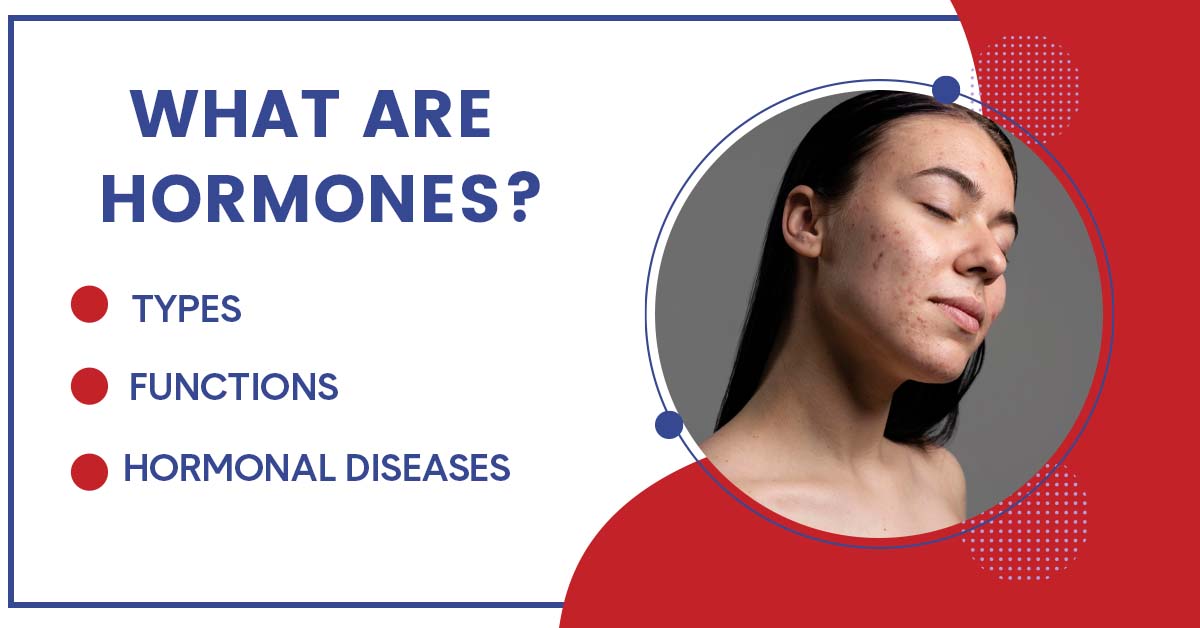What are Hormones?
Hormones are chemical messengers that help your body’s many systems work together. Your endocrine system is made up of several glands, organs, and tissues that produce and release a variety of hormones.
These messages instruct your body on what to do and when. Life and wellness depend on hormones. There are currently approximately 50 hormones known to science in the human body.
What is the Function of Hormones?
The following are a few crucial jobs that hormones perform:
- Food metabolism.
- Growth and development.
- Controlling thirst and hunger.
- Maintaining body temperature.
- Regulating mood and cognitive functions.
- Initiating and maintaining sexual development and reproduction.
Your body communicates in two different ways through hormones.
Communication between two endocrine glands is the first kind: A hormone released by one gland prompts a shift in the hormone levels being released by another gland. The interaction between your thyroid and the pituitary gland is an illustration of this. Thyroid-stimulating hormone (TSH), which is released by your pituitary gland, causes your thyroid gland to release its hormones, which subsequently have an impact on numerous areas of your body.
An endocrine gland and a target organ converse with one another in the second sort of communication. As an illustration, consider the time when your pancreas secretes insulin, which subsequently helps your muscles and liver metabolize glucose.
Types of Hormones:
The body produces a variety of hormones to control a variety of processes. These are their classifications:
- Peptide Hormones
- Steroid Hormones
Peptide Hormones
Amino acids make up peptide hormones, which are soluble in water. The cell membrane comprises a phospholipid bilayer that prevents any fat-insoluble compounds from diffusing into the cell, preventing peptide hormones from passing through the membrane. The pancreas makes the significant peptide hormone insulin.
Steroid Hormones
Steroid hormones, in contrast to peptide hormones, are fat-soluble and can cross cell membranes. Steroid hormones include sex hormones including progesterone, oestrogen, and testosterone.
Which Tissues or Glands Make Hormones?
The majority of the hormones in your body are produced and released by specialized glands that are part of your endocrine system. An organ that produces hormones, digestive fluids, sweat, or tears is referred to as a gland. An endocrine gland directs hormones into the bloodstream.
The glands in your endocrine system are as follows:
- Hypothalamus.
- Pituitary gland.
- Pineal gland.
- Thyroid.
- Parathyroid glands.
- Adrenal glands.
- Pancreas.
- Ovaries.
- Testes.
However, not all organs and tissues that secrete hormones or compounds similar to hormones are regarded as being a part of the endocrine system. Other organs and other organs that secrete hormones include:
- Adipose tissue (fat tissue).
- Kidneys.
- Liver.
- Gut (gastrointestinal tract).
- Placenta.
Glands and Hormones secreted by them
- Two organs called the adrenal glands to sit on top of the kidneys and secrete the stress hormone cortisol.
- As the hypothalamus in the lower middle brain instructs the pituitary gland about releasing hormones, it releases them as needed.
- Ovaries: The female reproductive system’s egg-producing and sex hormone-producing organs.
- Islet cells in the pancreas: Islet cells in the pancreas release hormones such as glucagon and insulin.
- Parathyroid: Four tiny neck glands called the parathyroid aid in bone growth.
- Pineal gland: A gland located close to the center of the brain that could influence sleep patterns.
- Pituitary gland: At the base of the brain, behind the sinuses is a gland called the pituitary gland. This gland affects numerous other glands, including the thyroid, which is why it is sometimes called the “master gland.” A malfunctioning pituitary gland may interfere with bone development, the way a woman’s menstrual cycle happens, or the way breast milk is produced.
- Testes: A male reproductive organ that produces sperm and sex hormones.
- Thymus: A gland in the upper chest that aids in the early development of the immune system in the body.
- Thyroid: A thyroid gland located in the front of the neck responsible for regulating metabolism.
Which Diseases are Caused by Hormone Issues?
Numerous illnesses are caused by hormonal imbalances. When hormone levels are too high or too low, there are symptoms and health implications. Often, treatment is necessary for these imbalances. In terms of hormone-related conditions, the following are the most prevalent:
Diabetes
Diabetes is a disorder that results in elevated blood sugar levels because the body is unable to make or use insulin effectively enough to control glucose. Type 1 and type 2 diabetes are two of the most prevalent varieties.
Diabetes results in the following symptoms:
- increased thirst and urination
- increased hunger
- unexpected weight changes
- persistent sores
- Hands or feet that are numb or tingly
- tiredness
- blurry vision
The majority of diabetic therapies include medicine with lifestyle changes. To help control their glucose levels, people with diabetes may need to take daily insulin treatments.
Hyperthyroidism
When the thyroid gland generates too many hormones, hyperthyroidism develops. There are several potential explanations for the disorder, such as Graves’ disease or thyroid gland inflammation.
The body’s energy use is regulated by thyroid hormones. This indicates that the illness may result in a variety of symptoms, such as:
- a rapid or irregular heartbeat
- difficulty sleeping
- irritability and nervousness
- tiredness
- poor temperature regulation
- frequent bowel movements
- weight loss with an increased appetite
- An enlarged neck growth called a goiter
The aetiology, the symptoms, and the patient’s general health all factor into the treatment of hyperthyroidism. They could consist of thyroid surgery, radioiodine therapy, or medicines.
Hypothyroidism
As a result of low thyroid hormone production, hypothyroidism develops. It is the most typical thyroid condition and can make the body functions sluggish.
Symptoms may include:
- tiredness
- sensitivity to cold
- slow speech
- droopy eyelids and facial swelling
- dry skin
- a slow heartbeat
- muscle cramps
- confusion
- constipation
- weight gain
- tingling in the hands
To assist control the symptoms, a doctor might advise supplementing the thyroid hormone dosage.
Cushing’s syndrome
When the hormone cortisol is present in excess, Cushing’s syndrome develops. Cortisol aids in blood pressure maintenance, metabolic regulation, and the body’s reaction to stress.
Symptoms of excessive cortisol in those with Cushing’s syndrome include:
- weight gain
- thin arms and legs
- a rounded face
- a fatty lump between the shoulders
- excessive hair growth
- muscle weakness
- blurry vision
- decreased fertility and sex drive
- tiredness
- easy bruising and purple stretch marks
Surgery to remove a tumor that is the problem is the most typical treatment for Cushing’s syndrome.
Acromegaly
When the body produces too much growth hormone, acromegaly results. It may cause the bones, organs, and other tissues all over the body to grow oddly. It may result in, for instance:
- swollen hands and feet
- the growth of facial features
- bone changes, such as a protruding jaw
- thick, dry skin
- sweating and body odor
- a deeper voice
Radiation therapy, surgery, and medication may all be used as treatments to shrink the tumor that is the cause of the disease.
PCOS
An imbalance in reproductive hormones may result in PCOS (polycystic ovarian syndrome), which affects the ovaries.
It can cause symptoms that include:
- irregular menstrual cycles
- excessive hair
- acne
- thinning hair
- weight gain or difficulty losing weight
- darkening skin
- skin tags
A doctor may advise hormonal birth control pills, anti-androgen drugs, or metformin to treat PCOS.
Osteoporosis
Osteoporosis is the weakening of bone tissue and decreased bone strength that results in frail bones. The wrist, hip, spine, and other skeleton sections become fracture-prone as a result of osteoporosis. Falls can have detrimental effects on a person’s health if they have osteoporosis.
It can cause symptoms that include:
- vertebral fracture or collapse resulting in back pain
- Loss of height over time
- A stooped posture
- a bone that fractures far more quickly than is typical
Pituitary Disorders
Tumors of the pituitary gland are abnormal growths that form there. Some pituitary tumors cause the pituitary gland to create too many hormones, while others may cause the pituitary gland to produce less hormone overall. It is common for pituitary tumors to be benign (non-cancerous) growths (adenomas). Adenomas don’t spread to other areas of your body; they stay in your pituitary gland or the tissues around it.
It may result in symptoms such as:
- Nausea and vomiting
- Weakness
- Feeling cold
- Less frequent or no menstrual periods
- Sexual dysfunction
- The increased amount of urine
- Unintended weight loss or gain
Note :- High Blood Pressure: Symptoms, Causes and Treatments


